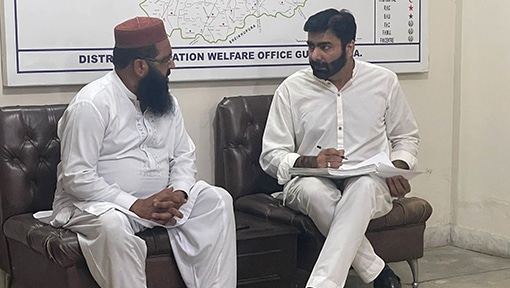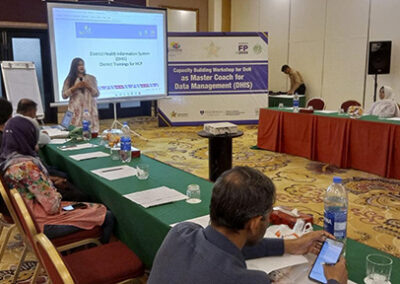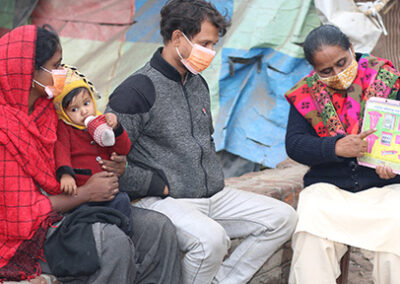
मौलाना अब्दुल कुदूस (बाएं) और तंजील उर रहमान (दाएं), TCIपाकिस्तान में ज्ञान प्रबंधक, उन कारकों पर चर्चा करते हैं जो धार्मिक विद्वानों को आम जनता के लिए चैंपियन परिवार नियोजन और इस्लाम में इसके महत्व के लिए प्रेरित करते हैं।
तथ्य के विपरीत, पाकिस्तान में एक आम प्रचलित धारणा यह है कि इस्लाम में परिवार नियोजन की अनुमति नहीं है। अल-अजहर विश्वविद्यालय जैसे कई प्रतिष्ठित इस्लामी संस्थानों और प्रसिद्ध मुस्लिम विद्वानों ने इस्लाम की परिवार नियोजन समर्थक स्थिति की पुष्टि की है।
पाकिस्तान में विभिन्न पहल और संगठन परिवार नियोजन को बढ़ावा देने में मुस्लिम धार्मिक नेताओं और विद्वानों को शामिल करते हैं। इन प्रयासों का उद्देश्य मुस्लिम आबादी को गर्भनिरोधक और प्रजनन स्वास्थ्य के बारे में सटीक जानकारी प्रदान करना है, जबकि धर्म की सीमित समझ के कारण किसी भी गलत धारणा और/या झिझक को दूर करना है।
इस तरह के प्रयासों में तेजी लाने के लिए, जनसंख्या कल्याण विभाग (पीडब्ल्यूडी) के समर्थन से the Challenge Initiative (TCI) ने परिवार नियोजन पर भरोसेमंद जानकारी को संबोधित करने और प्रदान करने के लिए विभिन्न इस्लामी विद्वानों को शामिल किया है क्योंकि यह इस्लामी शिक्षाओं और पवित्र पुस्तक कुरान से संबंधित है।
मौलाना शफीक उर रहमान, एक स्थानीय धार्मिक विद्वान और "रख किकरानवाली" के परिवार नियोजन चैंपियन में से एक, पीडब्ल्यूडी द्वारा आयोजित परिवार नियोजन उपग्रह शिविरों का नियमित रूप से दौरा करते हैं। इन शिविरों में, वह महिलाओं को संक्षिप्त वार्ता देते हैं और परिवार नियोजन के बारे में इस्लामी शिक्षाओं को स्पष्ट करने के लिए कुरान की आयतों का संदर्भ देते हैं, विशेष रूप से स्तनपान के संदर्भ में। मौलाना शफीक ने समझाया कि:
हम अपने जीवन में कपड़ों से लेकर खाने तक सब कुछ योजना बनाते हैं लेकिन परिवार नियोजन के बारे में कभी नहीं सोचते हैं, इस्लाम एफपी पर स्पष्ट मार्गदर्शन प्रदान करता है और इसीलिए हम एफपी के बारे में अपनी गलत धारणाओं पर चर्चा करने और उन्हें खत्म करने के लिए दो दिनों के लिए नियमित रूप से इकट्ठा होते हैं।
एक अन्य धार्मिक विद्वान, कारी अब्दुल कुदूस ने अपनी भूमिका और योगदान को समझाते हुए कहा:
बुनियादी स्वास्थ्य सुविधाओं का दौरा करने वाले परिवारों और एफएचडी (पारिवारिक स्वास्थ्य दिवसों) के दौरान जानकारी प्रदान करना अनिवार्य है। इस्लामी शिक्षाओं के मद्देनजर इस तरह की जानकारी का प्रसार करना मेरी अंतिम जिम्मेदारी है। हम बच्चे पैदा करने से कभी हतोत्साहित नहीं करते हैं, लेकिन हम उन बच्चों की संख्या के लिए प्रोत्साहित करते हैं जिन्हें एक अच्छी परवरिश प्रदान की जा सकती है।
पाकिस्तान में मुस्लिम धार्मिक नेताओं द्वारा परिवार नियोजन के तरीकों को बढ़ावा देना अक्सर जिम्मेदार पितृत्व के सिद्धांतों पर आधारित होता है, माताओं और बच्चों की भलाई सुनिश्चित करता है, और सूचित विकल्प बनाने का महत्व होता है। धार्मिक नेता इस बात पर जोर देते हैं कि परिवार नियोजन परिवारों के समग्र कल्याण में योगदान दे सकता है, उन्हें जन्म के स्थान पर ले जा सकता है, स्वस्थ गर्भधारण कर सकता है, और माता-पिता और उनके बच्चों दोनों के लिए जीवन की गुणवत्ता में सुधार कर सकता है।







